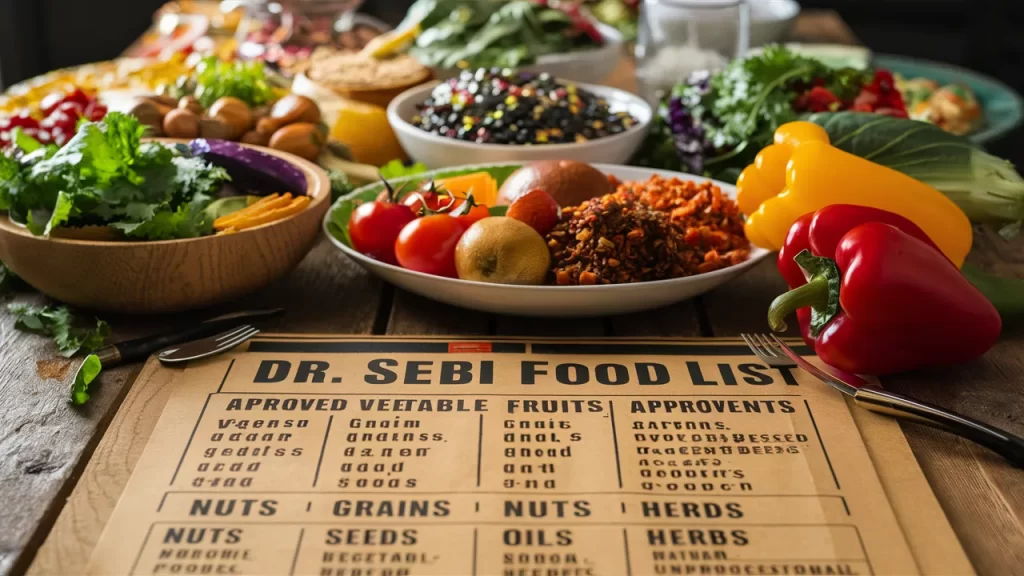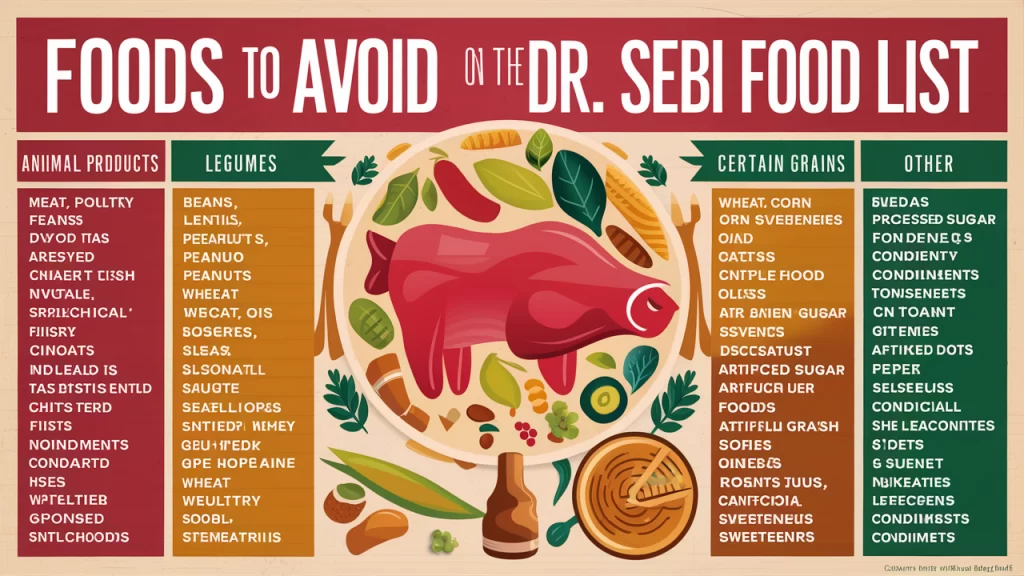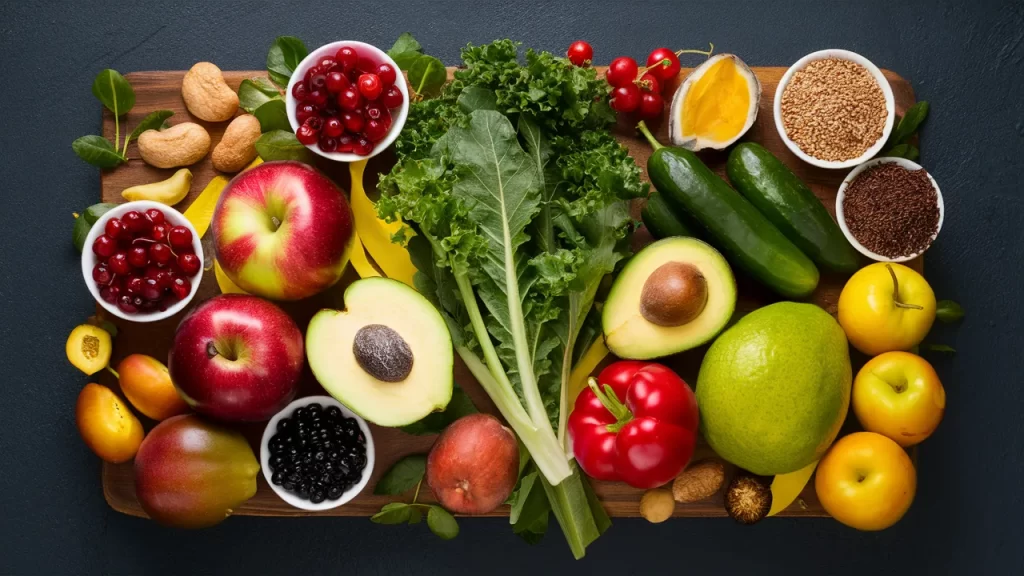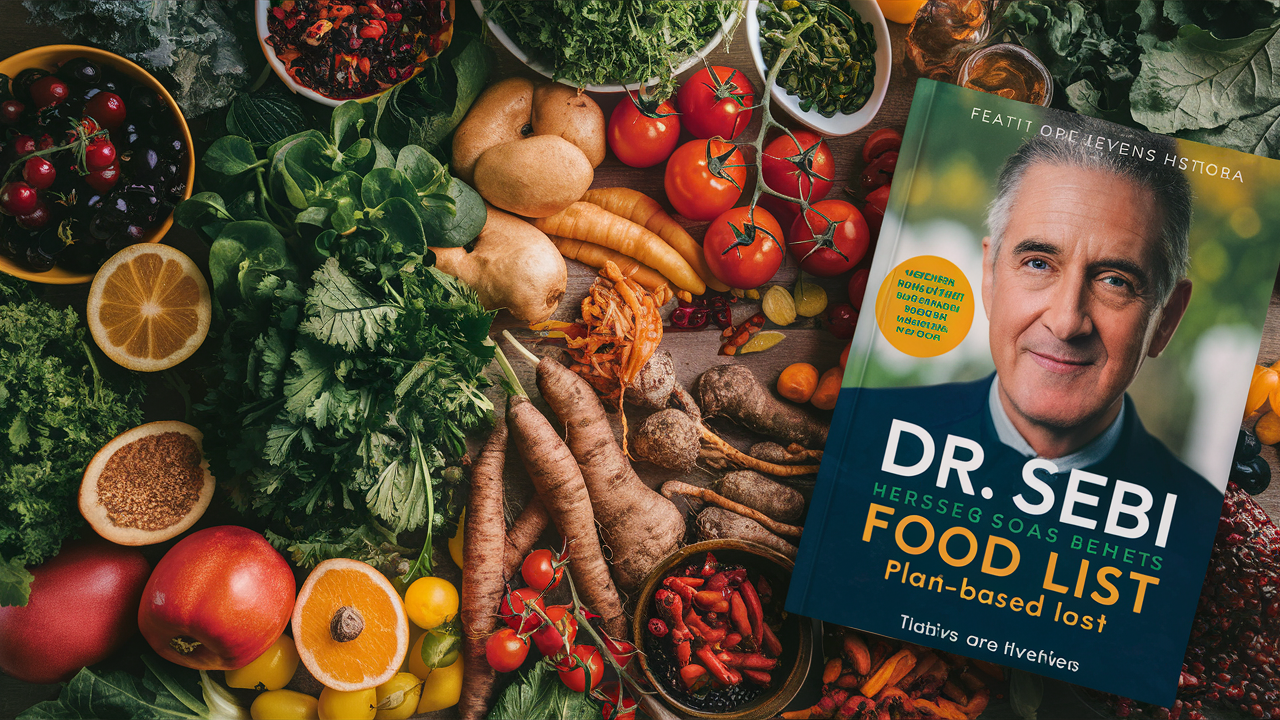Table of Contents
The Dr Sebi Food List is a core component of the Dr. Sebi nutritional approach. It was designed by the late herbalist Alfredo Bowman, who went by Dr. Sebi. This approach centers on consuming specific plant-based foods believed to promote an alkaline body environment for optimal health.
What is the Dr Sebi Food List?

The Dr Sebi Food List outlines a selection of approved vegetables, fruits, grains, nuts, seeds, oils, and herbs. Proponents believe these foods create an alkaline cellular milieu, which they claim is necessary for overall well-being and preventing disease.
Approved Foods on the Dr. Sebi Food List:
- Vegetables
Leafy greens like kale, dandelion greens, lettuce (except iceberg), bell peppers, cucumbers, avocados, okra, mushrooms (except shiitake), squash, zucchini, and cherry and plum tomatoes.
- Fruits
Apples, berries, cantaloupe, currants, dates, figs, elderberries, mangoes, papayas, peaches, pears, plums, seeded key limes, seeded melons, soursop, and tamarind.
- Grains
Amaranth, fonio, Kamut (Khorasan wheat), quinoa, rye, spelled, teff, and wild rice.
- Nuts and Seeds
Raw sesame seeds, walnuts, and Brazil nuts.
- Oils
All plant-based oils are allowed.
- Herbs and Spices
A wide variety of herbs and spices are encouraged, including but not limited to basil, cilantro, ginger, garlic, oregano, turmeric, and cayenne pepper. See You More Info Dr Sebi Food List.
Foods to Avoid on the Dr Sebi Food List:

Below are the foods that were not added to the Dr. Sebi food list because of their nutritional values.
- Animal Products: All animal products, including meat, poultry, fish, eggs, and dairy, are excluded.
- Legumes: Most beans, lentils, and peanuts are not allowed.
- Certain Grains: Wheat, corn, and oats are not part of the plan.
- Other: Processed foods, refined sugar, artificial sweeteners, condiments, and genetically modified organisms (GMOs) are off-limits.
Potential Benefits of the Dr. Sebi Food List:
- Increased Vegetable Intake: The Dr. Sebi food list emphasizes vegetables, a cornerstone of a healthy diet. Vegetables are rich in vitamins, minerals, fiber, and antioxidants, which can contribute to overall health.
- Focus on Whole Foods: By encouraging whole, unprocessed plant-based foods, Dr. Sebi’s list can lead to a more nutrient-dense diet.
- Potential Weight Management: The emphasis on vegetables and limited processed options may promote weight loss for some individuals.
Important Considerations:
- Limited Scientific Evidence: The core tenet of the Dr. Sebi diet – creating an alkaline environment for health – lacks strong scientific backing. The body tightly regulates blood pH, and dietary changes have minimal lasting impact.
- Nutrient Deficiencies: Excluding entire food groups, like legumes and certain fruits, can lead to nutrient deficiencies, particularly protein, iron, calcium, and some essential vitamins. Supplementation may be necessary.
- Sustainability and Social Aspects: The Dr. Sebi food list can be restrictive and expensive, making long-term adherence challenging. Additionally, limitations on certain cultural staples like beans and rice might make social eating difficult.

Consulting a Registered Dietitian:
Before Dr. Sebi’s Food List starts any new dietary plan, especially one as restrictive as the Dr Sebi Food List, consulting a registered dietitian is a must. They can assess your individual needs, and identify potential risks or deficiencies. Also, they can help create a personalized plan that aligns with your goals and preferences. Get More Info Food Diet.
How many people follow Dr Sebi’s Food List as their daily routine?
There’s no definitive data on exactly how many people follow the Dr. Sebi food list. Here’s why:
- Limited Popularity: While the Dr. Sebi approach has gained some attention, it’s not a mainstream dietary plan.
- Restrictive Nature: The restrictive nature of the list might discourage some from long-term adherence.
- Lack of Scientific Backing: The core claims about body pH haven’t been extensively studied, potentially leading some to choose other evidence-based plans.
However, the Dr. Sebi food list does have a dedicated online community and appears in searches related to plant-based diets. So, while the exact number is unknown, there’s a niche group following this approach.
Final Thoughts
The Dr Sebi Food List promotes a plant-based diet rich in vegetables and fruits. While it may offer some health benefits like increased fiber intake and a focus on whole foods, the claims about body pH and disease prevention lack strong scientific evidence. The restrictive nature of the plan can lead to nutrient deficiencies and social challenges. Consulting a registered dietitian is a must before embarking on this approach to ensure it’s safe and meets your individual needs.
FAQs:
Can I lose weight with Dr. Sebi’s food list?
Maybe. Focus on veggies & limited processed options may aid weight loss, but consult a dietitian for personalized advice.
Do I need supplements on the Dr. Sebi food list?
Likely. Excluding food groups can lead to deficiencies. Talk to a dietitian about protein, iron, calcium, and vitamin needs.
Is Dr. Sebi’s food list scientifically proven?
The “alkaline body” claim lacks strong science. Your body regulates blood pH, and diet has minimal lasting impact.
Can I eat beans on the Dr. Sebi food list?
No, most beans & lentils are off-limits. This can limit protein intake. Consult a dietitian about alternatives.
Is the Dr. Sebi food list expensive?
Yes, the focus on specific foods can be pricey. Consider affordability and long-term sustainability.
Can I socialize while on the Dr. Sebi food list?
Maybe, but limitations on cultural staples like beans can make social eating challenging. Talk to friends and family!




